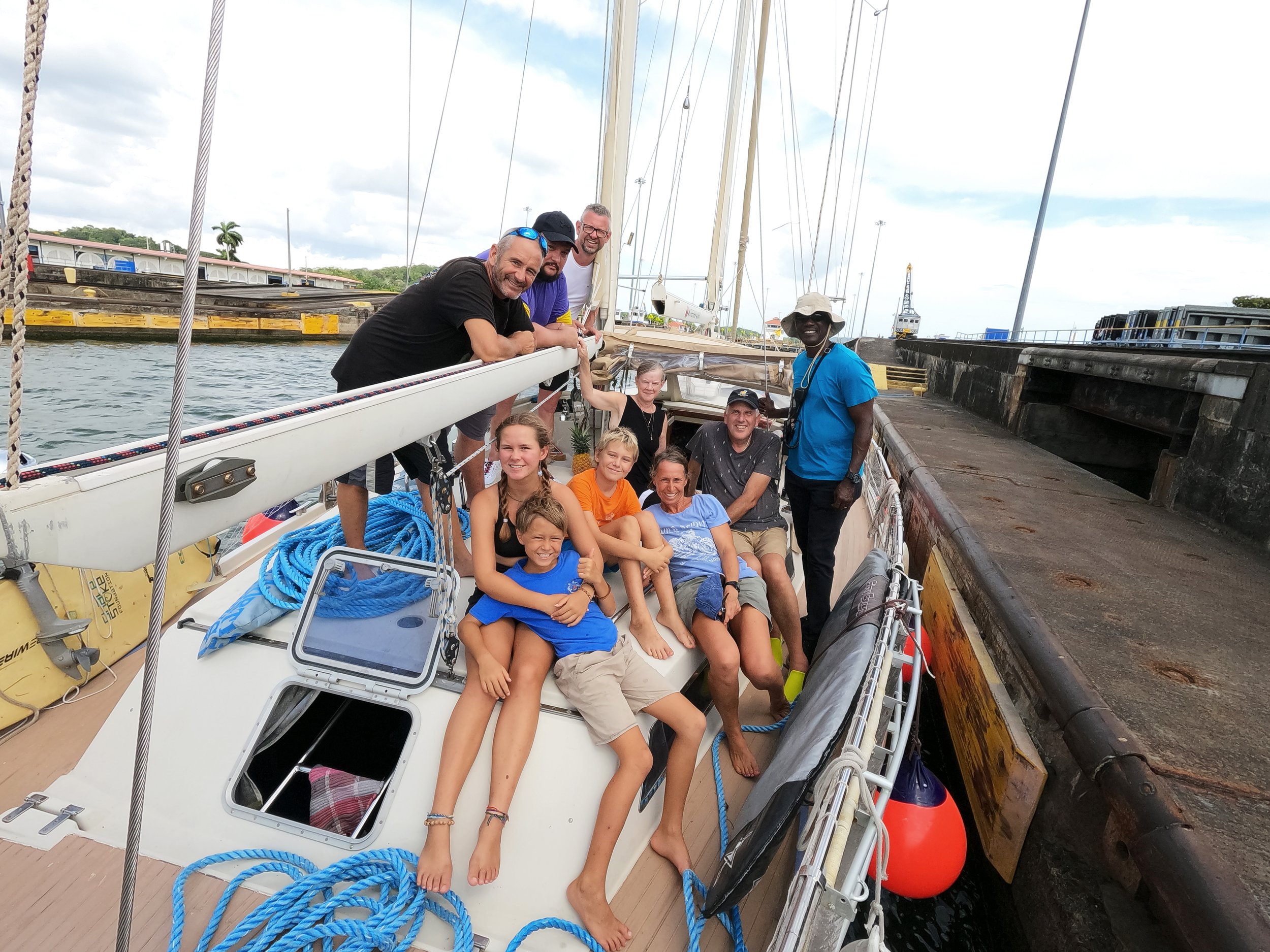DEFCON 5: How do I Learn to Sail?
01:02:05
Money is relative!
“If your ship doesn’t come in, swim out to meet it”
#15 DEFCON 5: How do I learn to Sail?
Sailing vs. Cruising
In the boating community, there's a subtle but important distinction to be made between 'sailing' and 'cruising.' Sailing involves travelling in a boat with a specific purpose and timeframe, such as day sailing, yacht racing, ocean crossings, or working on a boat. Cruising, on the other hand, means travelling in a pleasure boat without a particular destination or schedule.
Cruisers often live on their boats and are referred to as 'cruisers,' 'live-aboards,' or ‘yachties.' And while all cruisers are sailors, not all sailors are cruisers.
Why do I make this distinction? Well, because sailing is only one of many skillsets a cruiser must acquire but luckily, one of the easiest to obtain.
The Learning Curve
It may come of something of a surprise, but some cruisers don't like sailing. They see it as a means to an end - a way to travel from A to B to escape the rat race and see more of the world.
Think about when you first passed your driving test. You were excited to drive anywhere just for the thrill. Fast forward to middle age, and driving becomes a mundane task filled with daily commutes, school runs and tedious trips to visit relatives at the far end of the country. Now imagine every outing involves a bumpy, weather-dependent journey that takes days or even weeks to complete, with expensive DIY repairs to carry out in a foreign country at the end. That’s how many cruisers view ‘sailing’.
The payoff, however, is the type of unique freedom and adventure that only cruising can offer.
Where to Start?
While practical training is irreplaceable, you can start learning the fundamentals of sailing and cruising in the comfort of your own home over a nice cup of tea. YouTube offers valuable insights from sailors of various skill levels and experiences. However, be cautious of channels with high production values and large followings, as they may prioritise entertainment over accuracy. Smaller channels often provide more authentic and down-to-earth content.
Join online forums to engage with a community of like-minded individuals. Ask questions and stir up discussions about the best boats or most attractive sailing destinations. However, take online advice from arm chair cruisers with a pinch of salt, as truly experienced people are typically modest, quiet types who know that the only true authority and training ground is the sea.
YouTube offers valuable insights from sailors of various skill levels and experiences
Getting Practical Experience
While booking a course at a local sail training centre may seem like the obvious first step, don’t. Not for now at least. While recognised qualifications such as Day Skipper and Offshore Yachtmaster can be highly beneficial, they can be time-consuming, costly and frankly, not that relevant or even fun.
I have experienced burnt out instructors teaching on beaten up old boats with stinking toilets and damp beds that you wouldn’t let your dog stay in. Besides, they won’t necessarily give you an insights into what cruising life is really all about because many sailing instructors, although good sailors, are not and have never been cruisers.
Before circumnavigating with our kids, Irenka and I ran our own RYA training centre in the UK and were flotilla skippers and yacht trainers in the Mediterranean before that. After teaching thousands of people how to sail, all around the world we recommend a slightly different approach.
Flotilla Holidays
Consider starting with a flotilla holiday. These are great for novices, combining a sailing holiday with basic training and a sailing qualification. Reputable companies like Sunsail, The Moorings, and Dream Yacht Charter offer packages to suit all levels all over the world but there are many more locally based companies too.
Also, if your intention is to persuade a reluctant partner to share your cursing dream, then a flotilla holiday is by far the most likely way to succeed. If budget allows it’s worth taking a few flotilla holidays with diverse itineraries in different locations trying out a variety of boats.
It may seem decadent to lavish money on a holiday when you’re trying to budget for a sailboat or cruising life but it’s the perfect way to jump in and experience skippering your own boat without the stress, expense or responsibility of ownership. Once you have a few flotilla holidays under your belt, you can branch out with more confidence into bareboat charters with more independence.
Personal Tuition
For more focused learning, a skippered charter might is also a great first step. Charter companies offer skippers who can teach you on the go. This one-on-one training can be particularly beneficial for both complete novices and experienced cruisers looking to refresh their skills.
It may seem like a lazy stereotype, but men and women learn differently. I’ve had new brides on honeymoons storm off training boats (and possibly out of the fledgling marriage!) because their new guy pumped with sea air and a sense of ‘Master and Commander’ started barking orders at them during a training session. In that respect it may be worth asking the charter company about female trainers who can balance out a testosterone laden boat!
Sailing Clubs and Racing
Join a sailing club to access small sailboats or keelboats, often free for members. If you’re lucky they may have a small cruiser or two. Race boat skippers in clubs are often desperate for crew, so chances are you’ll be asked to get involved even if you’re just used as ballast! Racing may seem daunting at first and a world away from casual cruising, but it’s a great way to learn sail trim, close quarter manoeuvring and fun sailing banter.
Racing is a great way to learn sail trim, close quarter manoeuvring and fun sailing banter.
Crewing on Other Boats and Boat Deliveries
Crewing on other people’s boats will expose you to many sailing skills, boat management techniques, and.. personalities. You will gain valuable insights and pick up useful trick and tips through casual observation, immersion and conversation.
If you don’t have friends, families or acquaintances with boats, consider joining organisations like PYD and Crew Seekers, who often need crew for boat deliveries. This is suited to slightly more experienced sailors, as these journeys can be long and demanding and once under way, the only escape is overboard!
Skippers often value reliability, punctuality, humility, fitness, and eagerness over extensive sailing experience. Mechanical and cooking skills will get you straight to the front of the queue! Normally, flight costs will be covered but you will be expected to contribute towards food and other expenses.
Volunteer crew are always needed on boats, especially for deliveries
Good hygiene isn’t something you would normally list an asset but you’d be surprised at how quickly a boat can descend into an overpowering aromatic experience after a few days of water rationing. So perhaps hint at your capacity to maintain a favourable fragrance without using too much water..
Make sure you can manage any seasickness. The last thing a skipper wants is to be nursemaid to someone who is supposed to ease the burden of a passage, not to increase it.
In the small confines of a boat, personality traits become magnified and irritating habits become unbearable. If you a tendency to pick your nose or loudly express your political or religious views, learn NOT to. If your skipper or fellow crew members have those tendencies, learn to cultivate patience and restraint.
One of the favourite pastimes of skippers is to share horror stories of crew they’ve had on board. One of the favourite pastimes of crew is to share horror stories of skippers they’ve crewed for.
Don’t become one of those stories!
Get your hands dirty
You will learn far more about sailboats in a boat yard than you ever will sipping gin on the deck of a friend’s yacht and if you live near a marina, yacht club or harbour, chances are there’s a boat yard close by.
Look for day work in a boat yard to gain some experience
If you’re even half competent at DIY, put the word about that you’re looking for day work to gain some experience. Sometimes there are even noticeboards on which to post your availability. You might even earn a few quid on the side doing it too! However, check the policy of the boat yard first as some boatyard managers don’t like strangers working on ‘their’ boats.
Getting Qualified
Now that you’ve had some fun and a modicum of experience under your belt, maybe it’s time to start looking for an accredited training centre. Most countries require minimal qualifications to operate a leisure boat while others have their own sailing association with a formally recognised qualification route. Do some research on this.
The boating world can seem an intimidating world to penetrate at first but sailing is just a skill like any other. There is no secret and you don’t have to have it ‘in your blood'. It merely takes a little effort to get your foot in the door and some time and perseverance to master.
That's it for another week. Next week in DECON 6 I’ll be stripping down the thing that scuppers most cruising dreams - Maintenance!
“If your ship doesn’t come in..”
This A4 PDF Poster is available from our Patreon site:






